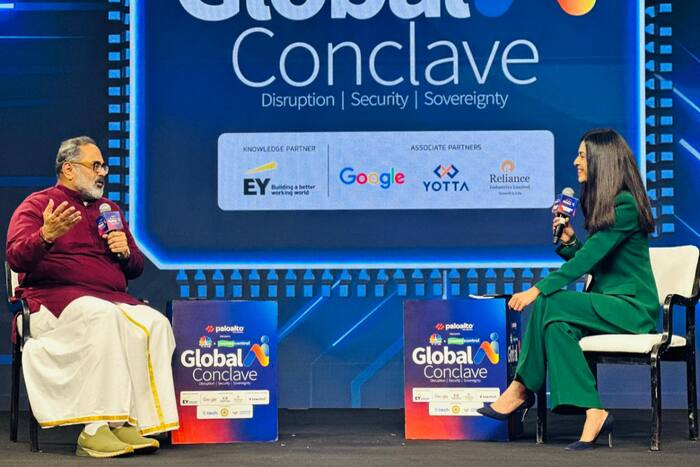
[ad_1]
The Minister emphasized that the Government of India has proactively addressed the challenges arising from the ubiquitous nature of the internet, addressing issues such as deepfakes, misinformation, and disinformation.

Misuse Of Artificial Intelligence: Union Minister of State for Skill Development & Entrepreneurship, Electronics & IT and Jal Shakti Rajeev Chandrasekhar on Saturday participated in a fireside chat organized by MoneyControl in Bengaluru, sharing insights on Artificial Intelligence (AI) and its potential impact on India. He highlighted that AI can propel India’s digital economy, fostering growth in sectors such as healthcare, agriculture, and governance. He emphasized the positive influence AI could have on startups, expanding their opportunities and contributing to India’s overall development.
“We see AI as a significant bolt to the already galloping Indian digital economy, acting as a kinetic enabler. To enable the AI ecosystem, we have put together an overall framework that talks about AI compute capacity. The Government will deploy financial resources for building foundational models, Large Language Models (LLMs), and various use cases. Similar to the semiconductor model, we will fund startups as well. We maintain a clear focus on building an academic, industry, and startup research ecosystem, which we refer to as the Innovation and Research Center. There are many adjacent areas as well, including AI chips, where we will have an intersection between the semiconductor program and the India AI mission. AI compute will have two segments: one led by the private sector, similar to the design of the semiconductor ecosystem with incentivized investments. The other segment involves indigenously developed public sector capacity for AI emerging from C-DAC, which will be available to the Indian ecosystem,” said Rajeev Chandrasekhar.
He highlighted the challenge of the chip shortage, noting that it is expected to resolve relatively quickly and emphasized the need for India to shift its focus towards nurturing AI talent, anticipating a growing ecosystem in the future.
The Minister emphasized that the Government of India has proactively addressed the challenges arising from the ubiquitous nature of the internet, addressing issues such as deepfakes, misinformation, and disinformation.
“We should focus on creating a global framework, not an American or European framework. The nature of the internet and our experiences on social media, the toxicity, and the crimes or harms it has shown us, that regardless of any country that has built rules and laws, the ubiquitous nature of the internet means that 80-90% of cybercrime or harms are extra-jurisdictional. The perpetrator may be in one jurisdiction, the victim in another, and the crimes in a third. Our approach is to ensure there are some principles, make sure there is a list of harms and criminalities as we see it today, and then keep adding to it as we encounter malicious models, biased, bigoted models, and algorithms. Deepfakes are a classic example because misinformation and patently false information are diseases that social media has spread, causing harm, especially in democratic countries. It creates divisions, incitements, and fake narratives. Misinformation has been a problem in social media; now imagine misinformation powered by AI,” the Minister further added.
[ad_2]